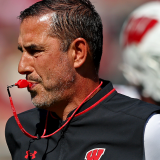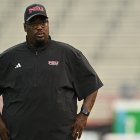SEC still lacks answers for how to further deal with 'serious misconduct'
Though the SEC was at the forefront of passing a player misconduct rule for transfers, it still does not know how to deal with incoming freshmen

HOOVER, Ala. -- It's the timing of those Jeffery Simmons punches now that should distress all of college athletics.
You remember Simmons, don't you? He's the celebrated/reviled Mississippi State five-star signee who was allowed to enroll this summer despite a very graphic and viral video of him beating up a woman.
Had Simmons been a transfer kicked out of school throwing those same punches it's "questionable" whether he'd be allowed in the SEC. That's the summation of Mississippi State athletic director Scott Stricklin himself.
The SEC was the first league to institute specific language barring recruits guilty of serious misconduct that includes stalking and dating violence. So at least there was a chance Simmons could have been barred.
But as a raw, 18-year-old blue-chip recruit, well, that's different. Simmons was able to enroll with his only punishment being a suspension for the opener and required counseling.
"I'm always [cautioning] people to be careful of judging one's character on 10 seconds of video," SEC commissioner Greg Sankey said Monday during the opening of the conference's media days.
We know from the summer's events all over the world in 10 seconds of video we can watched folks be maimed, injured or killed. It's hard to buy into the logic of Brock Turner's father, who said his son shouldn't be jailed for "20 minutes of action." Turner was the subject of Jane Doe's compelling letter in the Stanford rape case.
Putting a time limit on bad conduct simply doesn't fly. The Power Five commissioners can do a lot of powerful things. Last week, they got together and released a set of time demand reforms which will allow athletes more time to be, you know, students.
If those commissioners can improve the athlete experience, why can't they improve the human experience?
Those conferences were given autonomy 18 months ago because the implied threat was that they'd leave the NCAA. So far, they haven't done much with their new-found power. The satellite camps issue was horribly mishandled. A threat to revamp the much-criticized NCAA enforcement process has just sort of evaporated.
The Power Five (and the rest of FBS) couldn't agree on an early signing period. They also haven't taken the player misconduct thing far enough. If transfers can be barred for "serious misconduct," why can't incoming freshmen?
"That's a complex question," Sankey told me. "So, let's lay that out first."
The commissioner went on to explain to me why it's different for incoming recruits. They're largely minors coming from states with different laws. What about sealed documents that couldn't be accessed? What about those young lives with no prior record? At least in the case of transfers there is a prior record in which to refer.
"When someone enrolls in college, they are generally an adult," Sankey said. "You expect that you'll have access to more consistent information on which to base decisions."
But conferences can set their own set of rules. Playing football remains a privilege, not a right. The next step for those commissioner is taking the domestic/sexual violence scourge more seriously.
Two years ago, an SEC coach told me he immediately stopped recruiting Tyreek Hill based on his social media account. Hill was signed by Oklahoma State and later became the Big 12's newcomer of the year; he was eventually kicked off the team for punching and choking his pregnant girlfriend. The Kansas City Chiefs are still being criticized for drafting Hill in the fifth round.
After a summer of Baylor and Brenda Tracy's message, isn't it about time for more sexual/domestic assault awareness? Having talked to Tracy, I know she is in favor of holding incoming recruits to a higher standard.
To be fair, that discussion has started -- in the SEC and beyond.
"I know that we will have continuing conversations around those issues," Sankey told the room full of reporters Monday. "I won't predict outcomes. And we'll see if that leads to a statement, first from this conference and if we collectively [decide we] should say things. I think that might be the next step."
It was Nick Saban who helped the conference take up the "serious misconduct" transfer policy in the first place. (A policy that was expanded this offseason.) His acceptance of offensive lineman Jonathan Taylor was a bad idea from the beginning.
Taylor was accused of domestic violence at Georgia. The same thing happened Alabama. Saban ultimately kicked him off the team.
But using the fuzzy math of the SEC and all the Power Five conferences, Taylor would have had a heck of a chance to enroll as a freshman with those same issues.
Fair?
Try as he might to list all the positive aspects of his conference, Sankey had to address the topics of Simmons and violence against women. Tennessee recently settled a Title IX lawsuit with multiple women. The Baylor situation is going to get worse before it gets better.
"The activities [of] the last month remind us that we even need to be more sensitive," Sankey concluded.

















